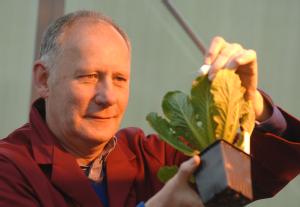University of Warwick research means new disease-resistant Brussels sprouts in prospect
 Researchers at the University of Warwick's Department of Life Sciences have uncovered the genetic basis of remarkable broad-spectrum resistance to a viral infection that, in some parts of the world, is the most important pathogen affecting leafy and arable brassica crops including: brussels sprouts, broccoli, cauliflower, cabbage, kale, swede and oilseed rape. They have tested resistant plants against a range of different strains of the virus taken from all over the world and so far, no strain has been able to overcome the resistance.
Researchers at the University of Warwick's Department of Life Sciences have uncovered the genetic basis of remarkable broad-spectrum resistance to a viral infection that, in some parts of the world, is the most important pathogen affecting leafy and arable brassica crops including: brussels sprouts, broccoli, cauliflower, cabbage, kale, swede and oilseed rape. They have tested resistant plants against a range of different strains of the virus taken from all over the world and so far, no strain has been able to overcome the resistance.
The research on the so-called Turnip mosaic virus (TuMV), led by Dr John Walsh of the University of Warwick and funded under the BBSRC Crop Science Initiative, has been taken forward in a new partnership with Syngenta Seeds.
Dr Walsh said “TuMV causes really nasty-looking black necrotic spots on the plants it infects - ‘a pox on your’ vegetables! This can cause significant yield losses and often leaves an entire crop unfit for marketing. At best, a field of badly affected Brussels sprouts might provide some animal fodder, but these vegetables would not be appealing to most shoppers. The virus is particularly difficult to control because it is transmitted so rapidly to plants by the insect vectors”
Dr Walsh and his team identified the major gene involved in resistance to TuMV and discovered that the way in which it creates resistance is completely new. Using this knowledge, they found that it was possible to identify plants with an inherent resistance that could be used to speed up the breeding process and develop commercial varieties that are resistant to TuMV.
The team from University of Warwick are now working with industry partner Syngenta Seeds to breed resistance into Chinese cabbage. They hope in future to do the same with other crops such as broccoli, cabbage and kale.
Peter van der Toorn, R&D Lead Leafy Crops, Syngenta Seeds Vegetables said “Working in partnership with academic researchers is very important for us. Through such collaborations it’s possible to take an idea from pre-commercial research and turn it into a new variety that can benefit the consumer and boost our contribution to the UK economy. We are very excited to be working together with academics at the University of Warwick to breed varieties with improved resistance to Turnip mosaic virus.”
Professor Douglas Kell, BBSRC Chief Executive said “Bioscience research in all its forms has always given rise to developments that have impacts in society – whether predicted or serendipitous. Such developments need a structure through which to realise their potential and a partnership such as this one between the University of Warwick researchers and Syngenta will be important to ensure that resistance to diseases is incorporated into commercial crop varieties. These new resistant varieties would then be available to contribute towards future food security.”
For further information please Contact
or
BBSRC External Relations
Nancy Mendoza, Tel: 01793 413355, email: nancy.mendoza@bbsrc.ac.uk
Tracey Jewitt, Tel: 01793 414694, email: tracey.jewitt@bbsrc.ac.uk
Mike Davies, Tel: 01793 442042, email: mike.davies@bbsrc.ac.uk
Matt Goode, Tel: 01793 413299, email: matt.goode@bbsrc.ac.uk
Notes to Editors
About BBSRC - The Biotechnology and Biological Sciences Research Council (BBSRC) is the UK funding agency for research in the life sciences. Sponsored by Government, BBSRC annually invests around £470 million in a wide range of research that makes a significant contribution to the quality of life for UK citizens and supports a number of important industrial stakeholders including the agriculture, food, chemical, healthcare and pharmaceutical sectors. BBSRC carries out its mission by funding internationally competitive research, providing training in the biosciences, fostering opportunities for knowledge transfer and innovation and promoting interaction with the public and other stakeholders on issues of scientific interest in universities, centres and institutes. The Babraham Institute, Institute for Animal Health, Institute of Food Research, John Innes Centre and Rothamsted Research are Institutes of BBSRC. The Institutes conduct long-term, mission-oriented research using specialist facilities. They have strong interactions with industry, Government departments and other end-users of their research. For more information see: http://www.bbsrc.ac.uk
PR160 18th November 2010
